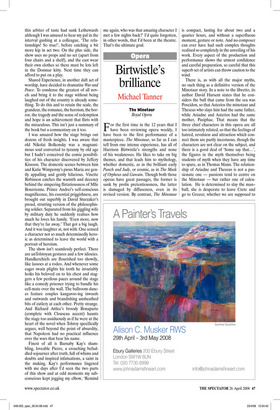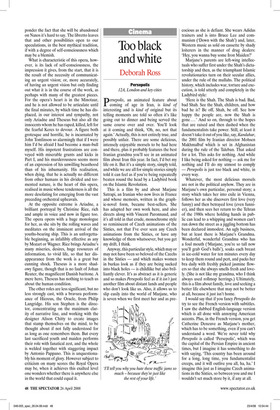Birtwistle’s brilliance
Michael Tanner
The Minotaur Royal Opera
For the first time in the 12 years that I have been reviewing opera weekly, I have been to the first performance of a masterpiece. The Minotaur, so far as I can tell from one intense experience, has all of Harrison Birtwistle’s strengths and none of his weaknesses. He likes to take on big themes, and that leads him to mythology, whether domestic, as in the brilliant early Punch and Judy, or cosmic, as in The Mask of Orpheus and Gawain. Though both those operas have great passages, the former is sunk by prolix pretentiousness, the latter is damaged by diffuseness, even in its revised version. By contrast, The Minotaur is compact, lasting for about two and a quarter hours, and without a superfluous moment, gesture or note. And no composer can ever have had such complex thoughts realised so completely in the unveiling of his work. Every aspect of the production and performance shows the utmost confidence and careful preparation, so careful that this superb set of artists can throw caution to the wind.
There is, as with all the major myths, no such thing as a definitive version of the Minotaur story. In a note to the libretto, its author David Harsent states that he considers the bull that came from the sea was Poseidon, so that Asterios the minotaur and Theseus who slays him had the same father, while Ariadne and Asterios had the same mother, Pasiphae. That means that the three chief characters in this opera are all too intimately related, so that the feelings of hatred, revulsion and attraction which connect them are partly incestuous, though the characters are not clear on the subject, and there is a good deal of ‘Some say that...’, the figures in the myth themselves being students of myth when they have any time to spare, as in Thomas Mann. The relationship of Ariadne and Theseus is not a passionate one — passions tend to centre on the Minotaur — but rather one of calculation. He is determined to slay the man– bull, she is desperate to leave Crete and go to Greece; whether we are supposed to ponder the fact that she will be abandoned on Naxos it’s hard to say. The libretto leaves that and other possibilities open to our speculations, in the best mythical tradition, if with a degree of self-consciousness which may be a blemish.
What is characteristic of this opera, however, is its lack of self-consciousness, the impression it gives, from the start, that it is the result of the necessity of communicating an urgent vision; or, more accurately, of having an urgent vision but only finding out what it is in the course of the work, as perhaps with many of the greatest pieces. For the opera’s heart is in the Minotaur, and he is not allowed to be articulate until the final minutes, by which time he has displaced, in our interest and sympathy, not only Ariadne and Theseus but also all the innocents whom he has raped, killed, left for the fearful Keres to devour. A figure both grotesque and horrific, he is incarnated by John Tomlinson so alarmingly that if I were him I’d be afraid I had become a man–bull myself. His impotent frustrations are conveyed with miserable grunts and kicks in Part I, and his murderousness seems more of an expression of his unwilling beasthood than of his inhumanity. His realisation, when dying, that he is actually no different from other humans in his divided and tormented nature, is the heart of this opera, realised in music whose tenderness is all the more desolating for emerging from the vast preceding orchestral upheavals.
At the opposite extreme is Ariadne, a brilliant portrayal by Christine Rice, rich and ample in voice and now in figure too. The opera opens with a huge monologue for her, as she sits by the rolling waves and meditates on the imminent arrival of the youths-bearing ship. This is an unforgettable beginning, as infallibly effective as any by Mozart or Wagner. Rice brings Ariadne’s many miseries, desires, huge resources of information, to vivid life, so that her disappearance from the work is a great but cunning shock. Theseus is a more shadowy figure, though that is no fault of Johan Reuter, the magnificent Danish baritone. A mere hero, Theseus has nothing to teach us about the human condition.
The other roles are less significant, but no less strongly cast, with a bravura performance of Hiereus, the Oracle, from Philip Langridge. His son Stephen is the director, concentrating on the maximum clarity of narrative line, and working with the designer Alison Chitty to create images that stamp themselves on the mind, to be thought about if not fully understood for as long as one remembers them. But every last sacrificed youth and maiden performs their role with fanatical zest, and the whole is welded together with staggering impact by Antonio Pappano. This is unquestionably his moment of glory. However subject to criticism on many scores the Royal Opera may be, when it achieves this exalted level one wonders whether there is anywhere else in the world that could equal it.











































































 Previous page
Previous page